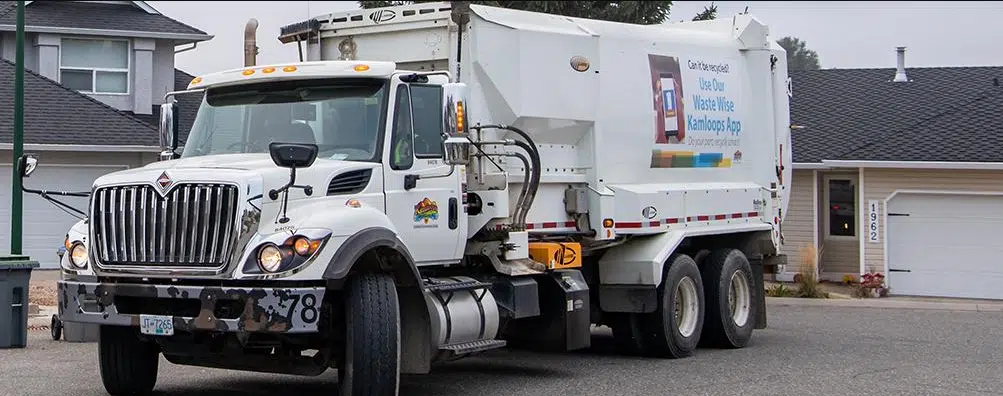
Photo via City of Kamloops
The City of Kamloops says it will continue to look into using new technology on its fleet of garbage trucks, after a proposal to do so was turned down by Council this month.
Environmental Services Manager Glen Farrow says the direction he got from Council was to implement an educational campaign, especially around the use of artificial intelligence to take “high level” scan of a recycling cart to minimize contamination.
“It would show a plastic bag full of garbage, say a chunk of Styrofoam, so really big, obviously bulky stuff so then we could identify that clearly,” Farrow said, on NL Newsday.
“We could send a letter to those residents letting them know, ‘hey, in the future. Please ensure your cleaning up that product and only putting the appropriate recycling in your recycling cart.”
“We do that right now with staff but its not nearly efficient and we’re not really covering many of the 28,000 carts that we have across the community,” Farrow added. “With this technology, we’d be able to scan each and every cart. Not looking at organics or garbage, but specifically recycling to ensure we’re lowering our contamination rate.”
Farrow told the March 5 Committee of the Whole meeting that the contents of each bin would be linked to a particular home via a serial number on each bin.
“It’s not scanning the labels on your soup container or your envelope,” Farrow told the Committee.
He also told Radio NL while the AI technology would have cost nearly $100,000, the City was hoping to use it to prevent further fines from Recycle BC. The City was fined $65,000 in 2022 because of high contamination levels, with the 2023 fine expected to be a larger amount.
“The business case works itself out very effectively because of those fines that are applied to us based on the contamination that we have at the curb,” Farrow said. “We will continue to look into this and see how it is functioning in other communities before we bring it back to the council table.”
“We’d really like to see two or three per cent [contamination]. There are certain loads where we are still at 10 or 12 per cent. It doesn’t take much to have a bit of garbage, a few books some higher weighted product to skew the contamination rate.”
Farrow also said the proposal – which was part of the 2024 Supplemental Budget – also included a new routing system on all Kamloops’ garbage trucks to reduce costs associated with missed pickups.
“Right now we have paper maps indicating where the routes are, what truck is to go on what road, and at which time to ensure that we complete the whole route within the appropriate time,” Farrow said. “There are technologies out there that we could have better handle on, and track it and ensure we have data coming back so when we do have a truck go down, its a quicker, easier response to shift the whole operation to pick up the route.”
“This is used right across the country, and [we were hoping to] get that routing technology in 17 of our vehicles, for garbage, recycling, and the new compost product.
Five councillors – Kelly Hall, Margot Middleton, Katie Neustaeter, Mike O’Reilly, and Bill Sarai – and Mayor Reid Hamer-Jackson voted against the two initiatives, which were set to begin next year.
“I am concerned that we need an education campaign first,” Neustaeter said during the March 5 Committee of the Whole meeting. “I am concerned that moving ahead with this feels to people like ramming government down their throat, as opposed to bringing them along in the process.”
“When I take look at the technology, I think it’s great, I think as we move forward it’s something that we can embrace, but I‘d like to see the data that we have with the new and improved collection capacity that we have right now,” Hall added.
Councillor Nancy Bepple joined Dale Bass and Stephen Karpuk voted in favour of the upgrades, which would have cost $271,750 in 2025 and 2026, with money coming from the City’s Solid Waste Reserve.
Farrow says the two initiatives would have led to a potential return on investment by 2027 through things like fuel savings and a reduction in fines and penalty.















